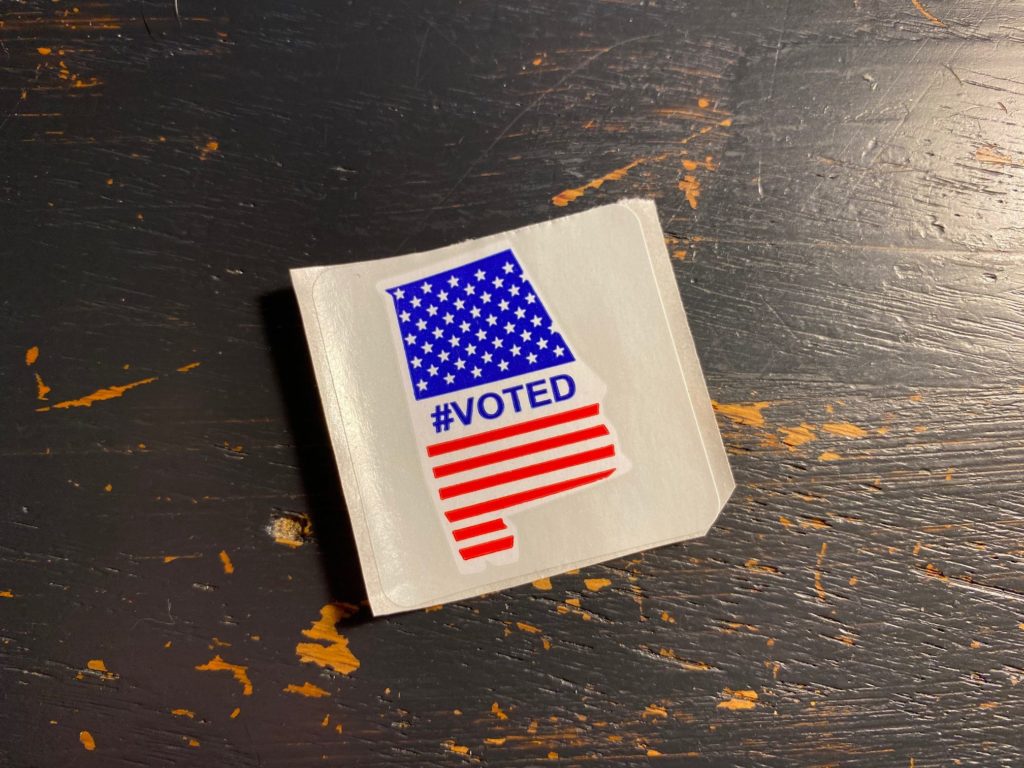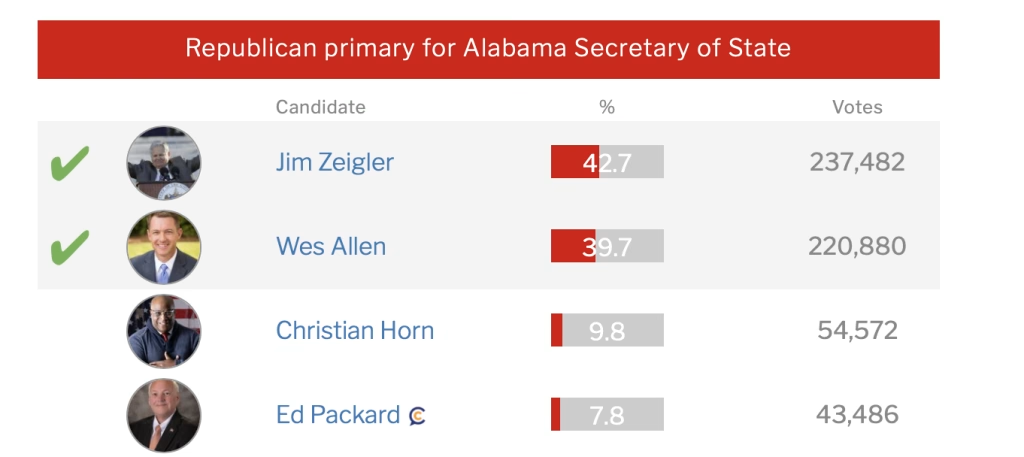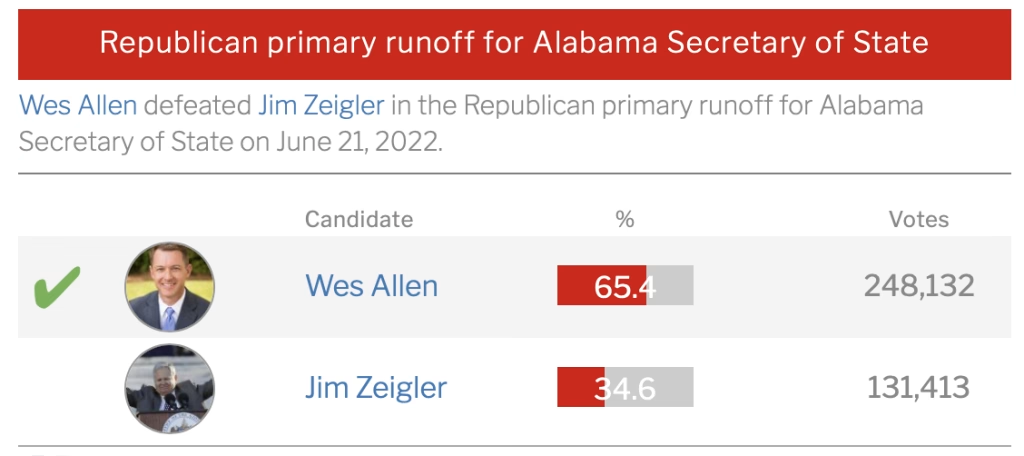Alabama Marked “Safe” from Ranked-Choice Voting
RCV is now banned in the state.

Governor Kay Ivey signed SB186 this week to ” to protect the integrity of Alabama elections by banning the use of ranked-choice voting.”
I will confess from the top that I have zero idea how this protects “the integrity” of elections. That is just sloganeering.
The Governor explains:
“I am proud to sign this bill which takes another step towards ensuring the confidence in our elections. As our Secretary of State Wes Allen put it, ranked-choice voting makes winners out of losers. Not only is ranked-choice voting confusing to voters, it also limits their ability to directly elect the candidate of their choice. Voting should be simple, and this complicated and confusing method of voting has no place in Alabama’s elections.”
This super-condescending: RCV is just too complicated for voters to worry their pretty little head over! But worse, this is nonsense, insofar as the basic mechanism of ranked-choice voting is no different than run-off elections, which Alabama uses for all primaries.
And, I would note, that sometimes the person who was winning in the first round, loses in the second round!
Why, it just so happens that that is how Wes Allen became Secretary of State!
Here’s the first round of the 2022 Republican primary for SoS:

And the run-off result:

Source: Ballotpedia.
The only substantive difference between RCV and a run-off like this is how long it takes to come to a resolution. Moreover, RCV would save money and have the advantage of having the same electorate for all rounds as opposed to somewhat different voters in round one and round two. To wit, in R1 above there were 556,420 voters and in R2 there were 379,545. Really, RCV is superior in a host of ways from the normal two-round process.
The issue is, really, whether we want a system that produces a plurality (simple majority) winner or an absolute majority winner. By definition any system that requires an absolute majority winner that has more than two candidates running can create a dynamic in which the final winner was actually losing in the first round of voting. It’s called math.
The entire purpose of any absolute majority outcome to ensure that the winner has, you know, the support of the actual majority.
The dishonesty/dissembling/ignorance of it all is just stunning–not to mention this is all pointless because, clearly, there is no appetite for RCV in the state so this is “protecting” Alabamians from a phantom menace.
It is truly courageous to ban something that no one was trying to do in the first place!
The sad thing is that this is a signal of opposition even to anodyne electoral reform. (The reality is, despite some hopes to the contrary, RCV would have very little effect on US politics, even if implemented widely).
Government is a reflection of the people who live in the jurisdiction. At the state and local levels, there’s not even an electoral college to blame for outcomes. GIGO.
@just nutha:
While not exactly the electoral college, the division of States into gerrymandered districts for State House positions accomplishes a similar task
@Matt Bernius: And my take is that gerrymandering becomes tolerated because the majority prefers corruption. I’ve become fatigued with notions of helpless majorities overwhelmed by corrupt minorities. It happens, certainly, but mostly, people get the government they deserve in aggregate– even in electoral college and gerrymandering situations.
If Trump loses a state by fewer votes than RFKJr gets, I think we will see a lot of people have very principled position changes.
That freak is still on the ballot in a lot of states, it could happen.
I can see, “a few people,” in a “the people who cast the ballots decide nothing; the people who count the ballots decide everything” sense, but not “a lot,” no. Corruption of this sort is too hard to pull off if you need a lot of personnel to do it.
You have to start beating people, breaking legs, very messy. 😐
Isn’t the law pretty much dead letter anyways, since any legislature with the votes to start RCV also has the votes to repeal this law?
Got no problem with ranked choice voting.
But my major issue is that valid citizens are being purged from voter lists now because of an over-exuberant R blood purity push.
I value being able to vote validly.
@Stormy Dragon: The post and link aren’t explicit, but I found an Alabama Daily News story that says the bill bans RCV in local elections as well as state. So the lege can change it, but the Troy city council can’t.
In FL we’re used to this. DeUseless doesn’t just refuse to do a thing at the state level, he makes it illegal for a city or county to do it. From his point of view that makes perfect sense. First, if you’re going to pander, you want to make it as blatant as you can. Second, decisions are based on some weird morality. If a thing is evil, it must not be allowed, anywhere. Dade County had voted to require water, shade, and rest breaks for outdoor workers in the summer. DeUseless decided not only would the state not require breaks, it would prohibit a county or anyone else doing so. After all, that might imply some belief summers are getting hotter, and that must not be allowed.
Seeing real-life error rates and exit polls has changed my mind on this. Bans like this one aren’t for the ‘right’ reason, but the reform is indeed more problematic than supporters might want to admit. I’ve also been paying attention to an Australian debate about informality (invalidity) and what might be causing it. There’s a lot going on with this issue, even in contexts that have served as models the US might emulate.
Marked safe from ranked choice voting, but more importantly (for them) Alabama is not marked safe from Vanderbilt.
This protects the integrity of Alabama elections because those elections reflecting the actual wishes of voters is exactly the opposite of what Republicans want to achieve.
For Republicans participating in elections, those elections only have integrity if Republicans win.
@Jack:
Care to show your work?